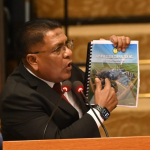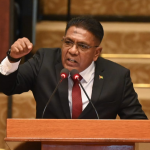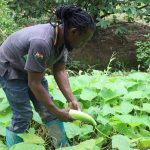A motion on the state of the rice industry, brought to the National Assembly by Opposition Member of Parliament (MP), Irfaan Ali was today, defeated by 28 to 33 votes. Government said the motion was short-sighted and not meant to bring relief to the farmers.
Debate on the motion which was first tabled in the National Assembly on May 12, continued today, with presentations by Opposition MPs, Dharamkumar Seeraj, Gail Teixeira and Ali.
The opposition MPs argued that the government has adopted “a don’t care attitude” towards the plight of the rice farmers as production is reduced and farmers face foreclosure of their properties by the banks.
Motion short-sighted
Responding to the opposition’s claims of government not doing enough for the rice industry, Government MP, Hemraj Rajcoomar said that the opposition’s motion is short sighted and government is more interested in longer- term solutions.
Prime Minister and leader of Government’s business, in the House, Moses Nagamootoo in his response highlighted the efforts of the government to aid rice producers in their time of need. The Prime Minister pointed out a menu of measures undertaken by the Coalition Government since its ascension to office.
Among the efforts of government identified by the Prime Minister are the fixing of pumps in various regions to mitigate the effects of El Nino, the release of $800M to pay rice farmers when Venezuela reneged on the Guyana/ Venezuela Oil for Rice agreement, and requesting the preparation of a new schedule for rice farmers’ payments to the Guyana Lands and Surveys Department (GLSC).
The Prime Minister also hastened to point out that Guyana now exports rice to 40 countries and is expected to double its export to Jamaica, at prices higher than the world market price.
Nagamootoo also reminded the House that the crisis facing rice is not the doing of the current government, but rather the result of actions by the previous administration.
The motion by Ali proposed nine measures which he said will rescue the industry. These include resuming talks and negotiations with Venezuela, removal of all forms of taxes and duties on fuel for the industry and removal of all taxes on input for the industry including machinery, equipment and spares.
The motion also calls for government to commence discussions with all commercial banks, lending to the industry, to review terms and conditions of loans, taking into account the low prices farmers are getting in order to “soften’ repayment conditions, to suspend payments of land leases and drainage and irrigation charges, and to lay supplementary provision in the National Assembly to provide financial support to farmers to aid in the purchase of seed paddy and fertilizer.
Other aspects of the motion catered for the immediate implementation of minimum export prices for rice and paddy, implementation of an aggressive marketing strategy in order to enhance prices and secure new lucrative markets and the withdrawal of the pronouncement that the rice industry’s crisis “is a private matter”.
The Government of Guyana, through the Ministry of Agriculture, continues to search for international markets for Guyana’s rice, ever since the closure of the Venezuelan market.
President David Granger has repeatedly assured rice farmers that their problems have not gone unnoticed and that his government has been seeking viable solutions towards reducing operational costs and creating viable markets.





